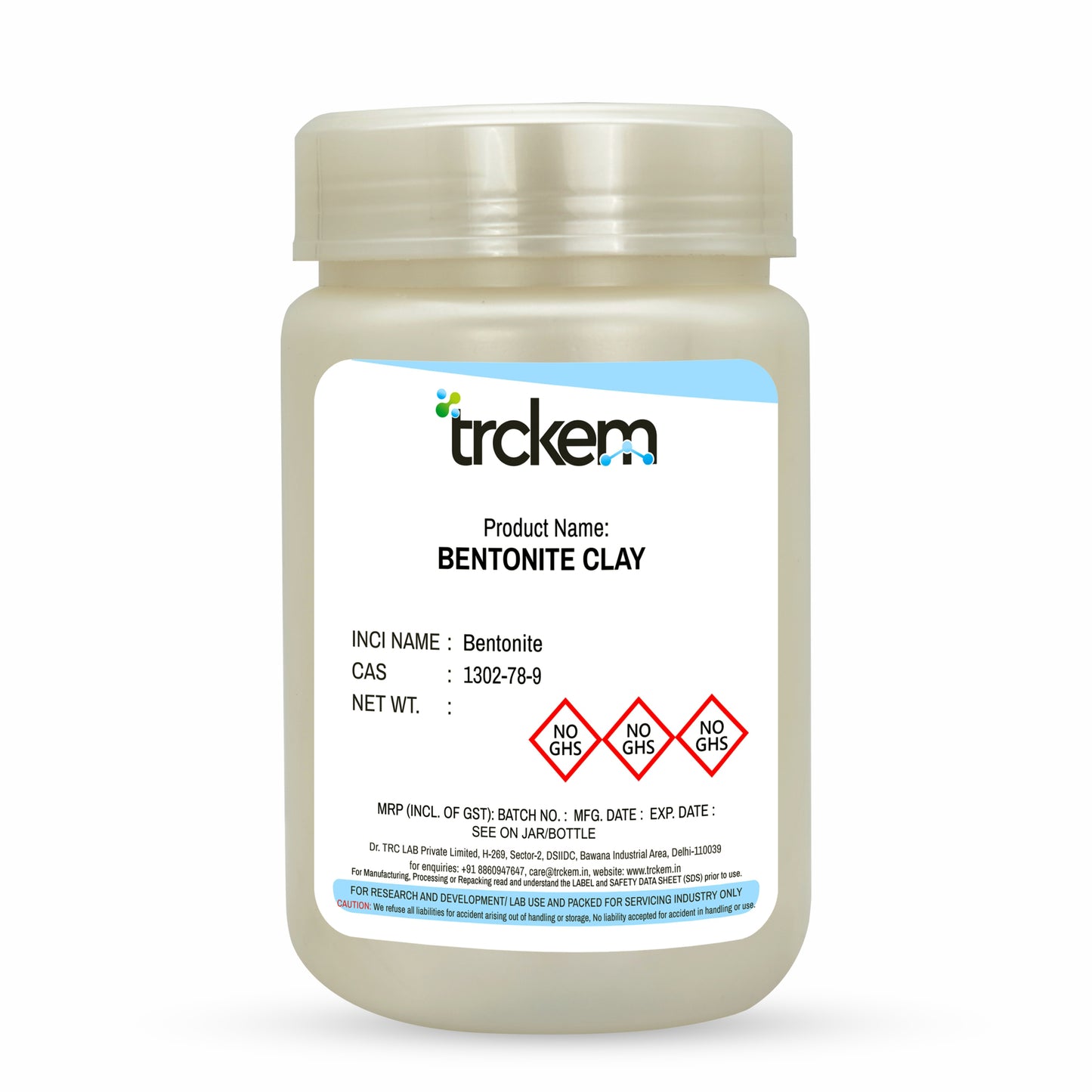




General Description:
Bentonite clay is a natural clay composed primarily of montmorillonite, a type of smectite mineral. It forms from volcanic ash that has aged over time, and it is known for its ability to absorb and adsorb impurities. Bentonite clay is usually a fine, odorless powder that swells when mixed with water, forming a paste. It has a high cation exchange capacity, which means it can attract and hold positively charged ions, making it highly effective in detoxification.
Uses in the Cosmetic Industry:
Bentonite clay is widely used in the cosmetic industry for its detoxifying, purifying, and healing properties. Its applications include:
- Facial Masks: Bentonite clay is a popular ingredient in facial masks due to its ability to draw out impurities, excess oils, and toxins from the skin, leaving it clean and refreshed.
- Acne Treatments: It is used in acne treatments to reduce inflammation, absorb excess oil, and help clear clogged pores, promoting clearer skin.
- Body Wraps: Bentonite clay is used in body wraps to detoxify and firm the skin, improving overall skin tone and texture.
- Bath Products: It is added to bath soaks and bath bombs for its soothing and detoxifying effects, helping to relieve skin irritations and muscle aches.
- Hair Care Products: Bentonite clay is included in shampoos and hair masks to cleanse the scalp, remove product buildup, and add volume to the hair.
- Toothpaste and Oral Care: It is used in natural toothpaste and oral care products for its mild abrasive properties and ability to bind to toxins, promoting oral health.
Hazard:
Bentonite clay is generally considered safe for use in cosmetics, but there are some potential hazards and considerations:
- Skin Irritation: Although bentonite clay is usually well-tolerated, some individuals with sensitive skin may experience irritation or dryness. It is advisable to perform a patch test before using products containing bentonite clay.
- Inhalation Risk: In its powdered form, inhaling bentonite clay dust can irritate the respiratory tract. Proper handling and protective equipment are necessary during manufacturing to avoid inhalation.
- Heavy Metals Contamination: Bentonite clay can sometimes contain trace amounts of heavy metals, such as lead or arsenic. It is important to source high-quality, purified bentonite clay to minimize the risk of heavy metal exposure.
- Eye Irritation: Contact with the eyes can cause irritation. Care should be taken to avoid eye exposure, and proper rinsing is recommended if accidental contact occurs.
- Internal Use Caution: While bentonite clay is sometimes used internally for detoxification, it should only be done under the guidance of a healthcare professional, as improper use can lead to digestive issues or mineral imbalances.
CAS Number: 1302-78-9
INCI: Bentonite
Composition: Bentonite clay primarily consists of montmorillonite, a type of clay mineral belonging to the smectite group. It also contains various minerals such as silica, aluminum, magnesium, calcium, and iron, which contribute to its absorbent and detoxifying properties.
Purity Grade: No purity grade applicable
Appearance: Bentonite clay is typically a fine, light gray to off-white powder with a smooth texture. When mixed with water, it forms a smooth paste.
Solubility: Bentonite clay is insoluble in water, but it swells and becomes gel-like when mixed with water, forming a colloidal suspension.
Preservation: Bentonite clay itself does not require preservation as it is naturally inert and stable. However, in formulations containing water or other liquid ingredients, preservatives may be necessary to prevent microbial growth.
Storage: Store in a closed container at a dry place at room temperature
Raw Material Source: Bentonite clay is formed through the weathering and alteration of volcanic ash deposits over millions of
years.
Manufacture: Bentonite clay is mined from natural deposits using conventional mining techniques. Once extracted, it undergoes processing to remove impurities and achieve the desired particle size and purity. The clay is then dried and milled into a fine powder suitable for use in various applications.
Animal Testing: Not animal tested
GMO: GMO-free (does not contain plant-derived components)
Vegan: Does not contain animal-derived components
Proposition: BENTONITE CLAY complies with relevant regulations and guidelines.
Warning: Avoid contact with eyes and skin. Use appropriate protective equipment when handling.
FAQ (Frequently Asked Questions)
1. What is the CAS number and INCI name of bentonite clay?
The Chemical Abstracts Service (CAS) number for bentonite clay is 1302-78-9, and its International Nomenclature of Cosmetic Ingredients (INCI) name is Bentonite.
2. What is bentonite clay?
Bentonite is a natural clay that typically derives from volcanic ash. It consists mainly of silica (58-61%), aluminum (21-22%), and various other minerals.
3. What functions does bentonite clay serve in personal care products?
In cosmetics and personal care formulations, bentonite clay serves multiple functions:
Emulsion Stabilizer: Bentonite is an excellent stabilizer of both oil-in-water and water-in-oil emulsions, even at low concentrations.
INCI.GUIDE
Absorbent: It effectively absorbs excess oils and impurities from the skin, making it beneficial in products like facial masks.
Thickening Agent: Bentonite is used to produce opaque gel in products such as acne creams, sunshades, and toothpaste.
4. In which personal care products is bentonite clay commonly used?
Bentonite clay is a versatile ingredient found in a variety of personal care products, including:
Facial Masks: Utilized for its absorbent properties to cleanse and purify the skin.
Creams and Lotions: Acts as a thickening agent and stabilizer.
Toothpaste: Provides texture and helps in cleaning teeth.
Hair Care Products: Offers conditioning benefits and improves product consistency.
5. Is bentonite clay suitable for all skin types?
Bentonite clay is generally considered safe and non-irritating, making it suitable for most skin types. However, individuals with very sensitive or dry skin should perform a patch test before widespread use, as the clay's absorbent properties may cause dryness in some cases.
6. How should bentonite clay be stored in personal care formulations?
Bentonite clay should be stored in a cool, dry place, away from moisture and contaminants, to maintain its efficacy. Proper storage ensures the clay retains its beneficial properties within personal care products.





